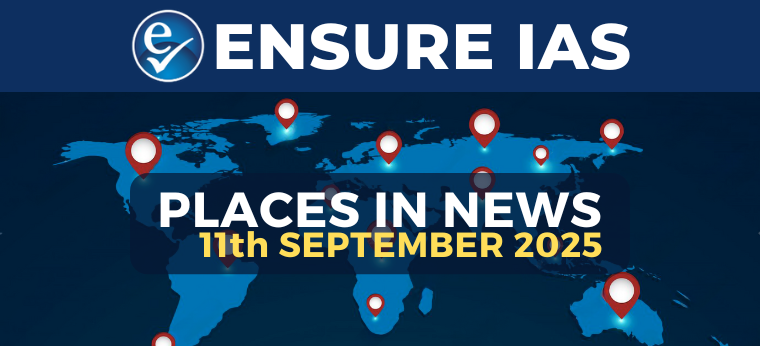Why in the News?
- Spain, Ireland, and Norway have officially recognised the state of Palestine, sparking a wider debate in Europe.
- The recognition comes amid the ongoing Gaza war, Israel’s rejection of the two-state solution, and rising humanitarian concerns.
- This move reflects a broader attempt by European nations to align their foreign policy with principles of sovereignty, human rights, and consistency in international law.
What Led to the Israel–Palestine Conflict?
- Late 19th–Early 20th Century: Competing Nationalisms
- Rise of Zionism: Jewish nationalist movement seeking a homeland in response to persecution in Europe.
- Rise of Palestinian Arab nationalism: Opposition to increasing Jewish immigration into Ottoman-controlled Palestine.
- 1917: Balfour Declaration
- Britain (which controlled Palestine after World War I) promised to establish a “national home for the Jewish people” in Palestine, while also pledging to protect the rights of existing non-Jewish communities.
- This created conflicting expectations among Jews and Arabs.
- 1920–1940s: British Mandate Period
- Surge in Jewish immigration due to persecution in Europe, especially during the Nazi era.
- Palestinian Arabs resisted, leading to revolts (e.g., Arab Revolt of 1936–39) and communal violence.
- Britain struggled to manage tensions and proposed partition plans.
- 1947: UN Partition Plan
- The UN proposed dividing Palestine into two states — one Jewish, one Arab — with Jerusalem as an international city.
- Jews accepted the plan; Arabs rejected it, viewing it as unjust.
- 1948: Creation of Israel and First Arab-Israeli War
- Israel declared independence in May 1948.
- Neighboring Arab states invaded; Israel survived but expanded its territory beyond UN allocations.
- Around 700,000 Palestinians were displaced — known as the Nakba (catastrophe).
- 1967: Six-Day War
- Israel fought Egypt, Jordan, and Syria.
- Israel captured the West Bank, East Jerusalem, Gaza Strip, Sinai Peninsula, and Golan Heights.
- Beginning of Israeli occupation of Palestinian territories (West Bank, Gaza, East Jerusalem).
- 1987–1993: First Intifada
- Palestinian uprising against Israeli occupation marked by protests, boycotts, and clashes.
- Led to global recognition of the Palestinian cause.
- 1993: Oslo Accords
- First direct agreements between Israel and Palestine Liberation Organization (PLO).
- Created the Palestinian Authority and raised hopes for a two-state solution.
- However, settlements, violence, and mistrust stalled progress.
- 2000–2005: Second Intifada
- Triggered by Ariel Sharon’s visit to Al-Aqsa Mosque compound.
- Far more violent than the first, causing heavy casualties on both sides.
- Deepened hostility and weakened peace efforts.
- 2007–Present: Hamas–Fatah Split and Gaza Conflicts
- Hamas took control of Gaza in 2007, while Fatah retained power in the West Bank.
- Multiple wars between Israel and Hamas (2008, 2014, 2021, 2023, 2024–25), marked by rocket attacks and heavy Israeli bombardments.
- Israeli settlement expansion in the West Bank and blockade of Gaza continue to fuel tensions.
| Key Terms 1. Hamas – A Palestinian Islamist political and militant group, ruling Gaza since 2007, known for armed resistance against Israel and designated as a terrorist organization by several countries. 2. Fatah – A secular Palestinian nationalist party, dominant in the Palestinian Authority, controlling the West Bank, and generally more open to negotiations with Israel. |
Key Highlights
- Catalyst: The Gaza War
- The October 7 attacks and Israel’s large-scale military response led to widespread destruction and humanitarian catastrophe.
- The Israeli PM’s rejection of the two-state solution further weakened hopes of peace.
- Legal proceedings at the ICJ against Israel added global moral and legal pressure.
- Impact of Ukraine on European Stance
- Russia’s 2022 invasion of Ukraine forced Europe to uphold sovereignty and condemn territorial aggression.
- This exposed Europe’s double standards on Palestine, leading to intellectual and civil society criticism.
- Recognition of Palestine is now seen as necessary to restore Europe’s credibility and moral authority.
- Domestic Political Pressures on Europe
- Public opinion strongly supports adherence to international law in all conflicts (Eurobarometer survey: 72%).
- Youth-led protests, student encampments, and human rights activism demand decisive government action.
- Centre-left and green parties face electoral risks if seen as passive on Gaza.
- Divergent National Positions
- Spain, Ireland, and Norway acted faster due to historical sympathies and internationalist traditions.
- Germany and Austria remain hesitant due to Holocaust-linked commitments to Israel’s security.
- Eastern European states recognised Palestine decades ago but now align with U.S. priorities.
- EU-Level Coordination and Limits
- EU’s Common Foreign and Security Policy requires unanimity, preventing a collective stance.
- Hence, recognition decisions rest with individual member states.
- However, like-minded countries (Spain, Ireland, Norway) are coordinating to build political momentum across Europe.
Implications
- Diplomatic Significance
- Recognition signals a shift in Europe’s foreign policy posture.
- It challenges Israel’s narrative and strengthens global support for the two-state solution.
- Geopolitical Realignment
- Europe positions itself as a more independent actor, not fully aligned with U.S. or Israeli positions.
- It increases Europe’s role in shaping West Asian peace efforts.
- Impact on Israel-Palestine Conflict
- While symbolic, recognition pressures Israel diplomatically.
- It may revive Palestinian hopes of international legitimacy.
- EU Internal Dynamics
- Highlights fractures within the EU’s foreign policy approach.
- Sets precedent for a gradual de facto collective position through individual recognitions.
- Global Ripple Effects
- Could encourage other regions to follow suit.
- Strengthens the case for Palestine in multilateral forums like the UN.
Challenges and Way Forward
| Challenges | Way Forward |
| Lack of EU consensus due to differing historical and political contexts | Encourage incremental recognition through like-minded coalitions |
| Strong Israeli and U.S. opposition to unilateral recognition | Promote dialogue-based recognition tied to peace efforts |
| Risk of symbolic recognition without material impact on ground | Link recognition with humanitarian aid and state-building support |
| Holocaust legacy making countries like Germany cautious | Frame recognition as consistent with international law, not anti-Israel |
| Fragile Palestinian political institutions (Hamas vs. Fatah divide) | Push for Palestinian political reconciliation alongside recognition |
Conclusion
The recognition of Palestine by Spain, Ireland, and Norway marks a symbolic but significant shift in Europe’s approach to the Israeli-Palestinian conflict. Driven by the Gaza war, the Ukraine precedent, and domestic political pressures, this move reflects a growing European desire to project values of justice and sovereignty consistently. While recognition alone cannot resolve the conflict, it preserves the viability of the two-state solution and signals that Europe is no longer willing to remain a passive observer in West Asia’s unfolding crisis.
| EnsureIAS Mains Question Q. The recent recognition of Palestine by Spain, Ireland, and Norway highlights the growing divergence within Europe’s foreign policy. Critically examine how this shift impacts the future of the two-state solution and Europe’s global credibility. (250 Words) |
| EnsureIAS Prelims Question Q. With reference to the recognition of Palestine by European nations in 2024–25, consider the following statements: 1. Spain, Ireland, and Norway have recently recognised Palestine as a state. 2. The European Union requires unanimity among all member states for a common foreign policy stance. 3. Germany and Austria were among the first to recognise Palestine due to their historical experience with the Holocaust. Which of the statements given above is/are correct? A. 1 only Answer: B (1 and 2 only) Statement 1 is correct: Spain, Ireland, and Norway recognised Palestine. Statement 2 is correct: EU’s Common Foreign and Security Policy requires unanimity, hence no collective stance. Statement 3 is incorrect: Germany and Austria are hesitant, not supportive, because of their Holocaust legacy and strong pro-Israel stance. |
Also Read | |
| UPSC Foundation Course | UPSC Daily Current Affairs |
| UPSC Monthly Magazine | CSAT Foundation Course |
| Free MCQs for UPSC Prelims | UPSC Test Series |
| ENSURE IAS NOTES | Our Booklist |




